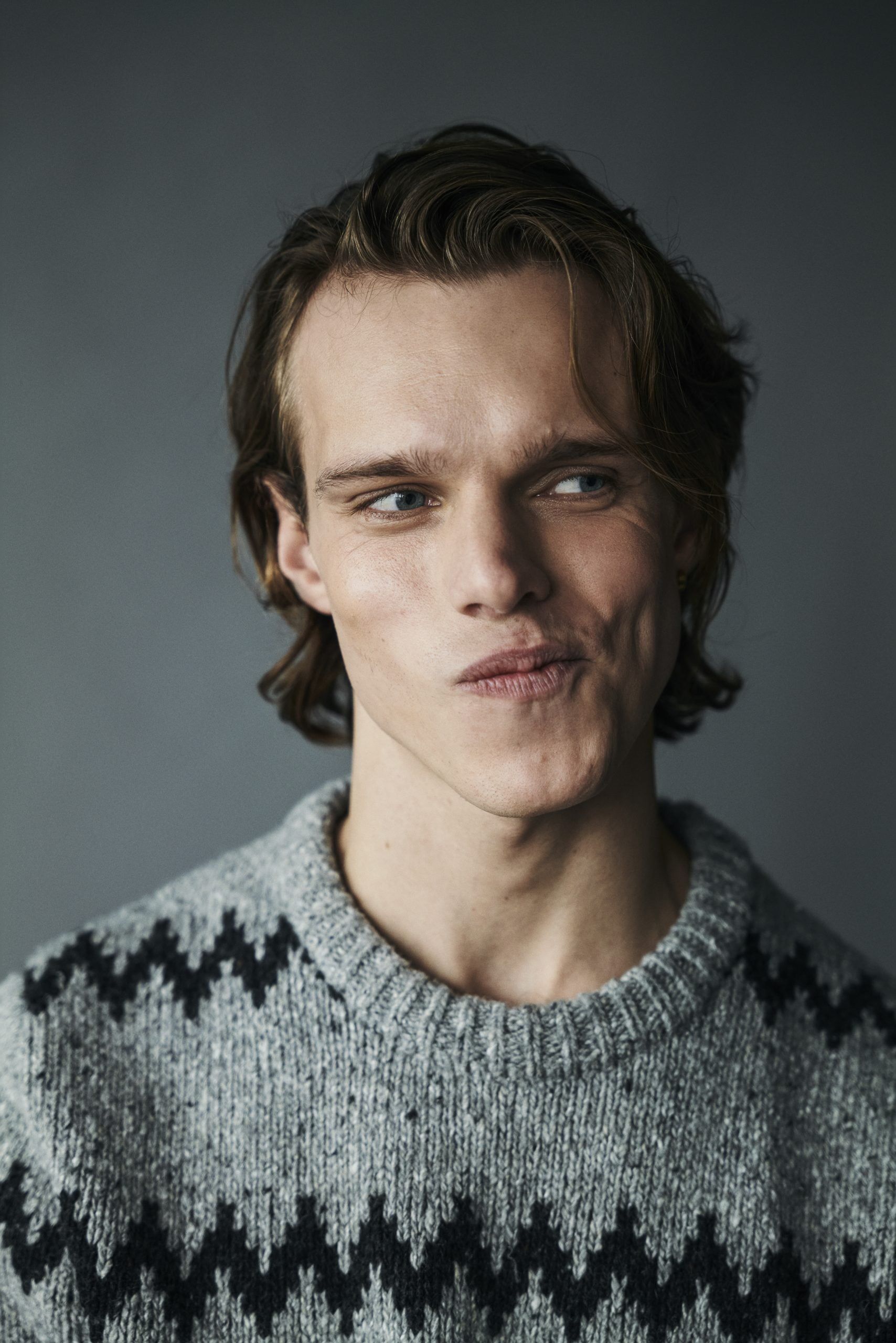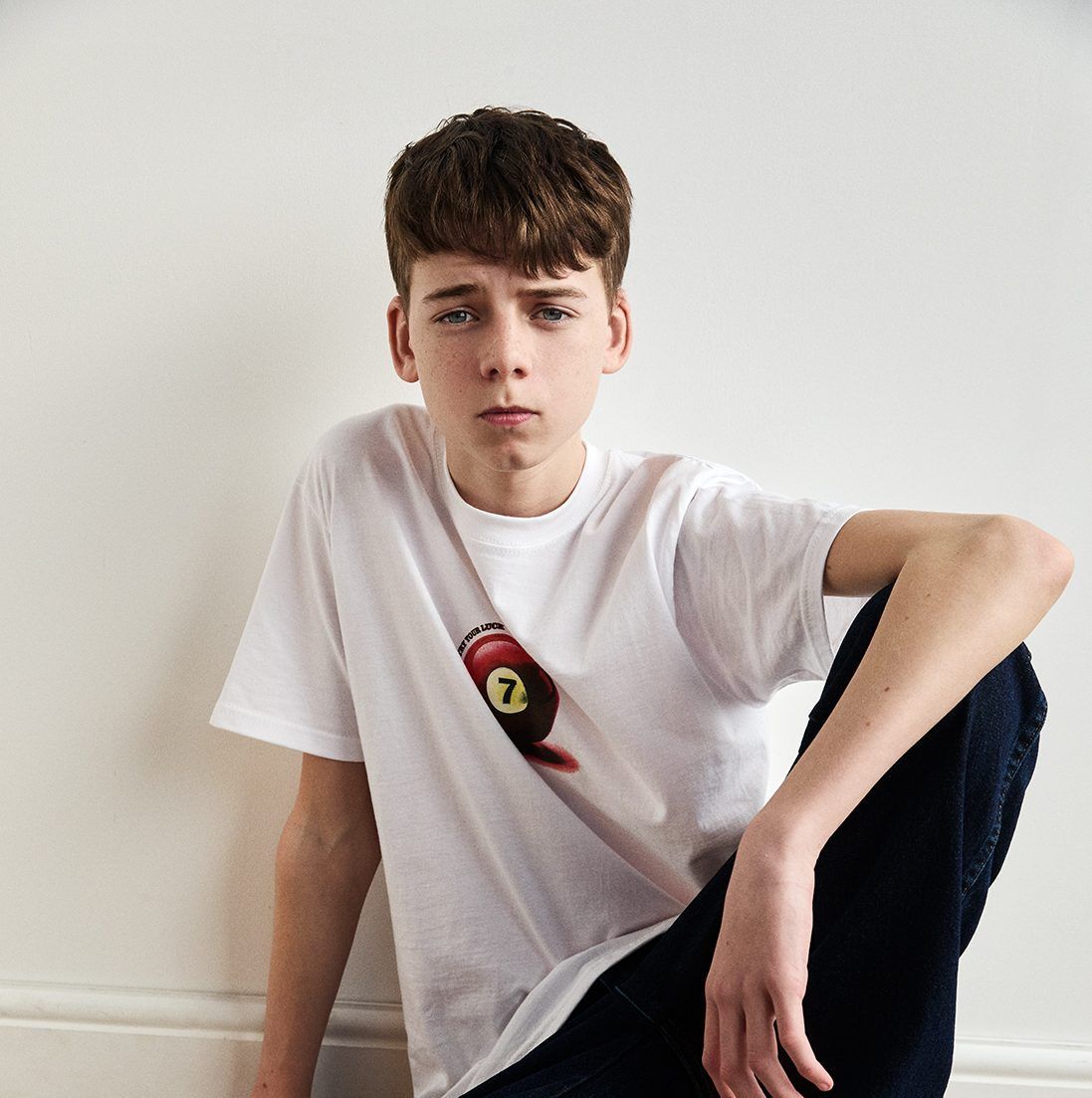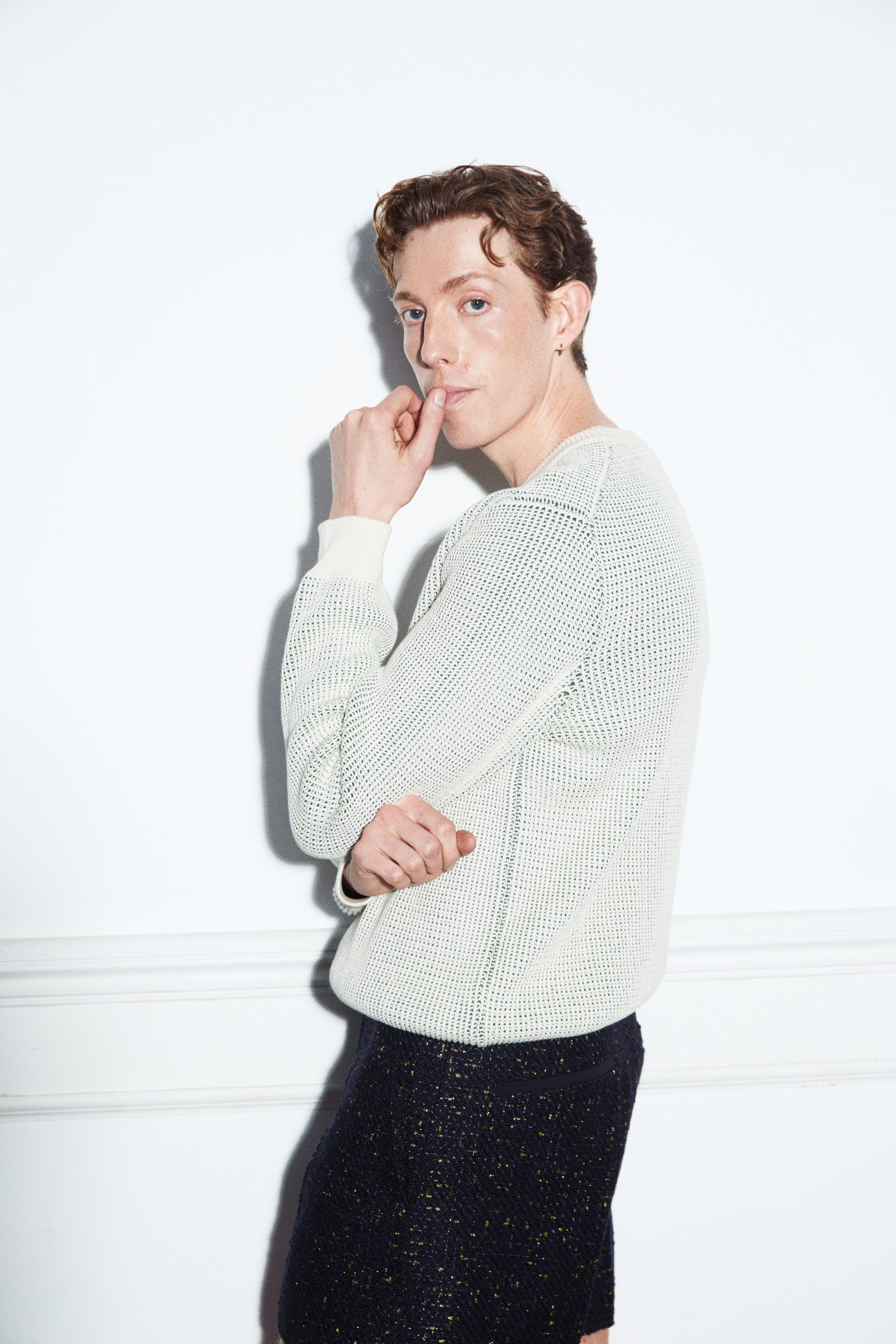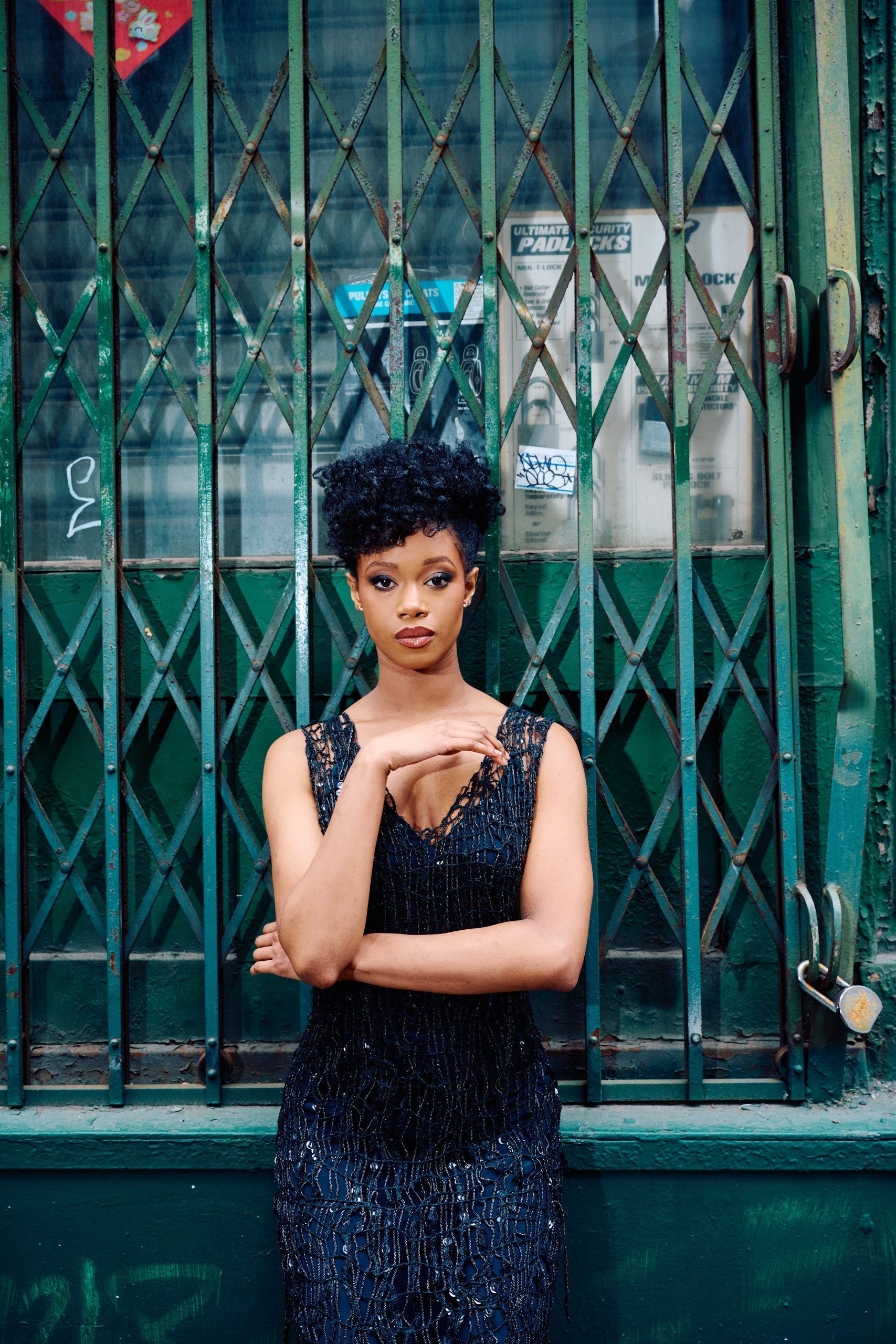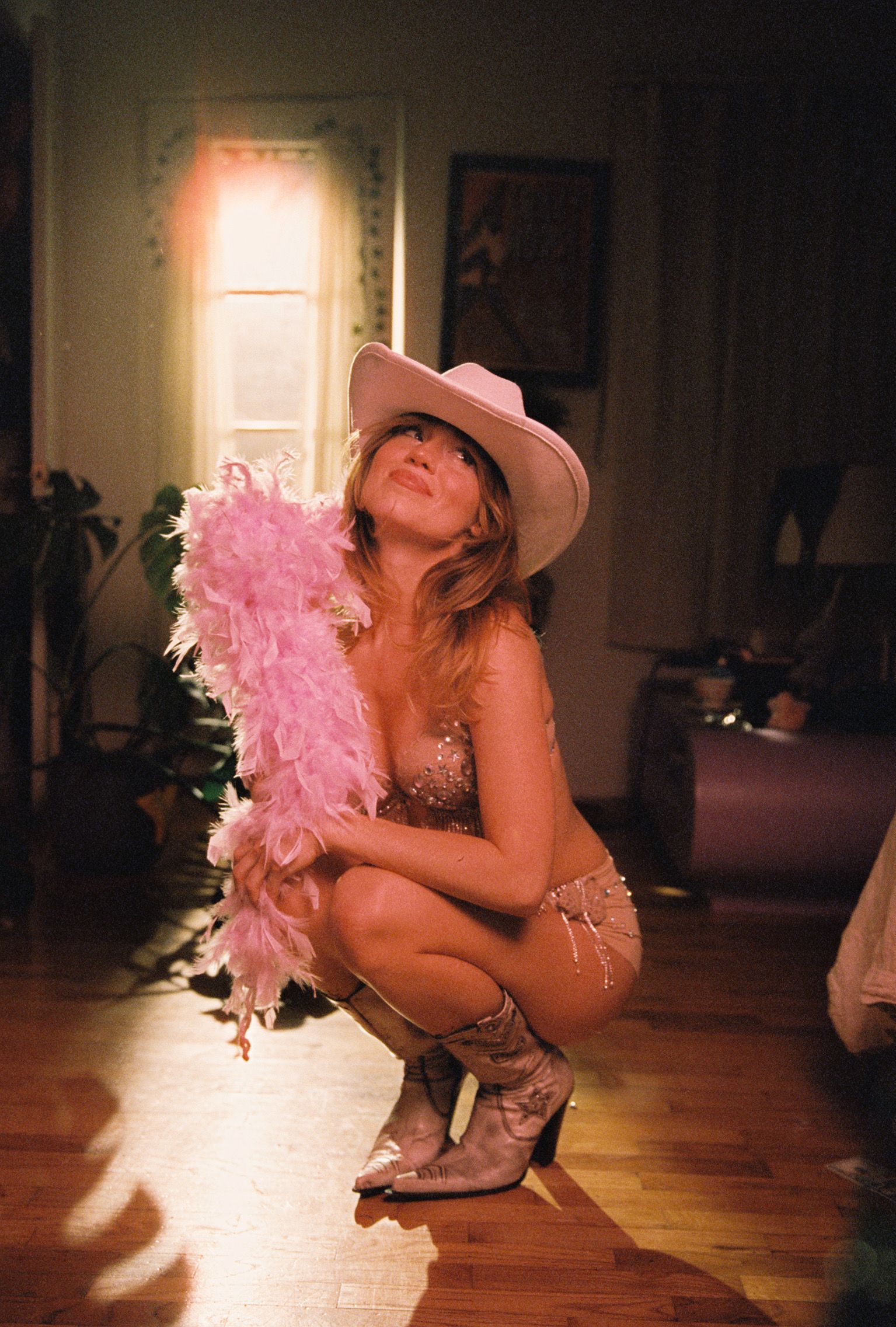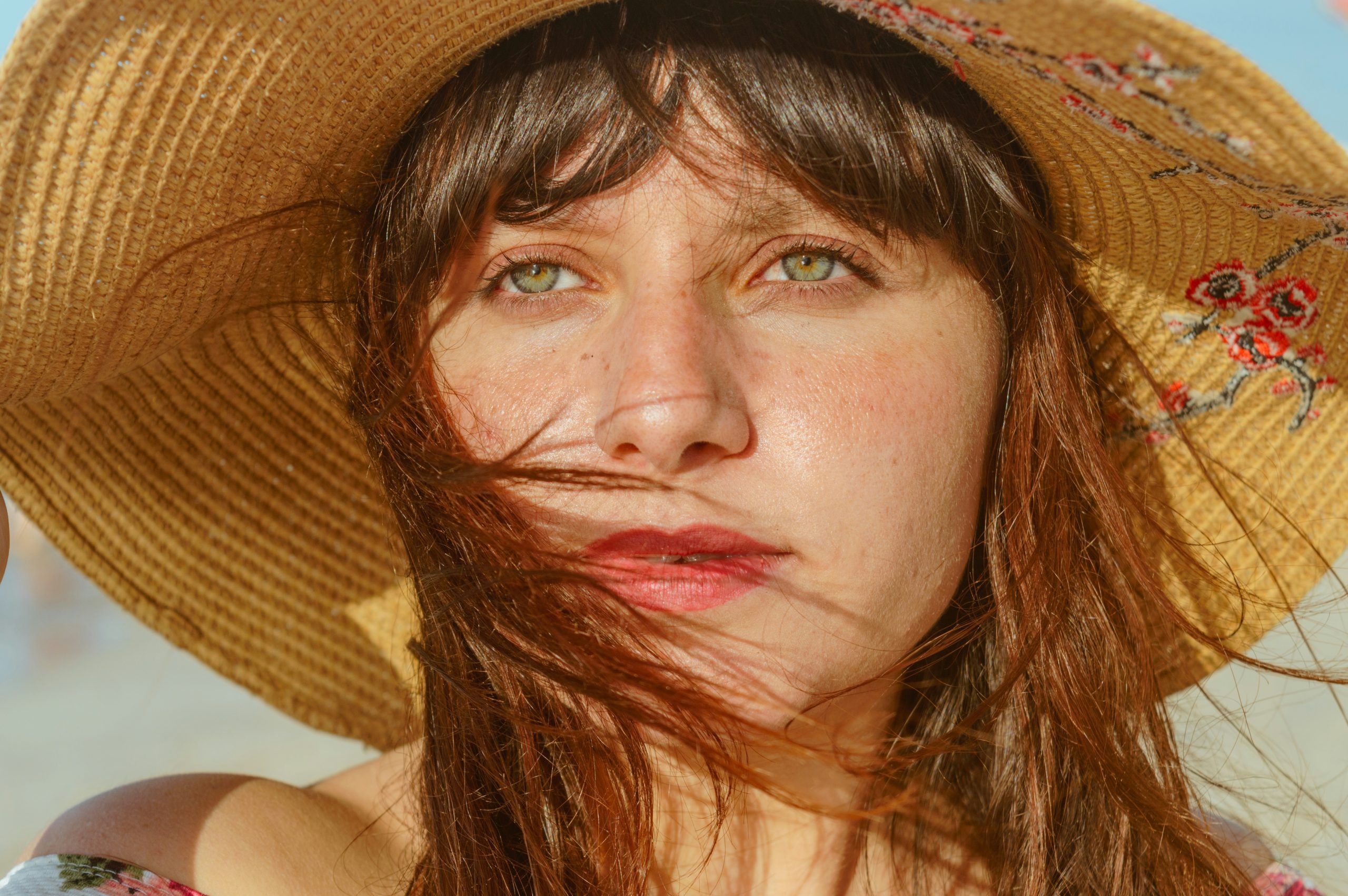Following the hit finale of True Detective: Night Country, rising actor Finn Bennett is looking ahead while reflecting on the decisions that got him to where he is today.
Finn Bennett is a lover of everything make-believe. The Irish-British actor spent Saturdays playing pretend at Stagecoach drama school in London which was, at first, meant to be something for his sister and he was just tagging along. Once realizing just how much he loved slipping away into a story or a character, he caught the acting bug and never looked back.
Since then, he’s been in the historical series Domina and the detective drama Kiri, the latter eventually leading him to esteemed director Issa López who suggested he audition for the upcoming season of the beloved anthology crime drama True Detective. López’s take on the show would eventually become True Detective: Night Country, a chilling tale that stars Jodie Foster and Kali Reis, takes place in Alaska, and follows a sudden disappearance of a team of researchers. Bennett stars as Pete, Foster’s character [Danvers] police protege. Bennett easily brings Pete’s boyish quality to life, delivering lines like “Who’s Mrs. Robinson?” with equal parts innocence and charm.
Bennett’s portrayal of Pete and his sprawling, shocking arc is a testament to his dedication to his character and the project. It’s not exactly something he learned — he didn’t go to drama school and didn’t feel like university was the right choice — but acting became something that is already embedded in his DNA. Deftly he balances Pete’s state of mind — juggling being a good husband, father, and son while trying to live to Danvers’ expectations of being a good cop. It is that intense pressure which eventually causes him to crack at the end of the season, forcing both audiences and Bennett himself to question whether he made the right decision.
1883 Magazine’s Kelsey Barnes sits down for a chat with Finn Bennett about his beginnings as an actor, why watching the finale of True Detective: Night Country made him cry, and more.
When you look back at your childhood, was there a specific story or fairytale in a book or film that resonated with you and that inspired you to become an actor?
Oh boy, I think this changes all the time. I’m constantly seeing things that make me think, “I want to be that kind of actor.” One of the things my dad showed me when I was young was In the Name of the Father with Daniel Day-Lewis. I come from an Irish family and the film is about the Irish struggle in Northern Ireland. I found it really captivating and moving and the performances incredible.
I read that you attended Stagecoach drama school on the weekend when you were growing up. Can you tell me a bit about what that experience was like? How did that shape you as an actor?
At the time, my sister was in a difficult place and she was unhappy. On a friend’s recommendation, they suggested to my parents that they should send her to a school on Saturdays that focuses on drama, music, and dance. They sent me as well just to get me out of the house. She obviously benefitted from it a lot, but I really, really loved it. I wouldn’t say I was bullied at school or anything, but I wasn’t exactly comfortable. I never felt comfortable in my surroundings. Drama on Saturdays was the best part of my week. I thought the teacher we had was so funny and creative, he’d make us play games and do improvisation and stuff. I got so much out of it.
Did you go to university after?
So, I did sixth form and I got into uni, but I just don’t think I would’ve gone to uni for the right reasons. All my friends were going which made it a hard choice because I was faced with the fact that I was probably going to be lonely. I had various jobs at the time, like working in cafes and stuff. It gave me some comfort but I was lonely and I missed my friends. I wasn’t really doing what I loved doing… And then I got a job in Rome. I was there for two or three months and more work started coming in. I started travelling and meeting other actors and the rest is history.
Touching on going away for work — the world of True Detective: Night Country is one you wouldn’t typically have access to in London. You spent spent six months in Iceland. How did being secluded away not just from friends and family but from your regular life for such a long stretch help you get into the role of your character Pete?
I think it’s funny because it’s the nature of the job [to travel] and I didn’t lose any friends when I was in Iceland and I did neglect some friendships, which is bad to say! I think you almost replace those friendships temporarily while on set. In terms of putting it into Pete’s mind, the people on set became my family — they were the people I’d see every day. Those are real bonds made with the people I spent day in and day out with.
There’s a scene in episode two where Danvers is pushing Pete to keep ‘asking the question,’ particularly with Pete in the hockey rink. I feel like that might be helpful advice to flesh out a character — what questions did you ask yourself to help build Pete’s character?
Good question. The big one was how he felt in the world around him. I had to ask myself questions in terms of how much research I had done and how much I should do. Obviously, I’m from London, and it’s a world away from rural Alaska. In terms of asking myself questions, I had to put in research, like what would life be like? What would it be like living in proximity to an indigenous community? And the way I did that was I would speak to Peej, a man who wasn’t from Alaska but he moved there fairly young, like 14 or 15. He met his future wife, an Indigenous woman and they now have a child together. He dealt with all these problems that arise in the show, in Pete’s and Kayla’s relationship. I just asked him what life was like for him and what he’d do day-to-day, what music he listened to, the clothes he wore, and more.
You were basically doing my job as a journalist.
I was doing just that!
Was it stressful for you to come up with questions or was it just natural since you were so interested in this person’s life?
It was difficult because I think it comes from the pressure to be a professional in a way. You get this massive job and you’re thinking about how you really have to show up on set. You need to know your stuff. I’d start off with these big, deep questions, but I realized that what makes up a person’s life is the small stuff, like what they eat for breakfast. I don’t want to say it’s the boring stuff, but it is the mundane crucial things that become the fiber of your being. The more I leaned into those questions, it became less stressful. We talked for about an hour every week.
I enjoyed the dynamic between Hank and Pete and how it touches on toxic masculinity. There’s a line in episode three when Pete says “What if I don’t want to be a sweet idiot” after not being able to shut off work, which I think speaks to him feeling like he needs to be more manly. What was it like playing with those themes on-screen?
It’s good because he [John Hawkes] is such a sweet guy and a really good-natured person. He treated everyone with a lot of respect and gave me a lot a time. Kayla, Pete’s wife, is stressing him out and he doesn’t handle it the best. He also can’t really connect with his father and that makes for a really interesting relationship. They are both completely emotionally unavailable men. There are moments where they try and they just can’t do it, they can’t bring themselves to be vulnerable. It’s hard for Pete to not have a strong male role model.
Yeah, the scene where he’s painting his house for his mail-order bride girlfriend who never ends up coming… Pete can’t even bring himself to try to say that to his father.
He can’t, it’s like he’d just rather let sleeping dogs lie. It’s heartbreaking and I think he must think that he’s doing his dad a favour.
Episodes 5 and 6 were huge for you. I know you shot out of order but the scene with Pete shooting his father — and the clean-up after — happened later on at the end of shooting. At that point you were with Pete for 5 months — did that scene feel like you were wrapping up part of this journey?
Yeah, it’s a big climax for his character. For the entirety of episode six, he’s completely focused on the task. It’s something he hasn’t done before and he has this laser focus that he can’t snap out of.
It’s very regimented.
It is, and that’s the way we wanted it to feel on set. Issa and I worked together to create that feeling. She didn’t want to see me panicked, she wanted to see a blank stare — like I was just doing things one after another. If you [Pete] stop at any moment, you’re going to panic and collapse. You almost see that in the car with Kayla when he does nearly collapse, but she lets him go and he gets himself back together. We just really wanted to create a sense of urgency but task-by-task.
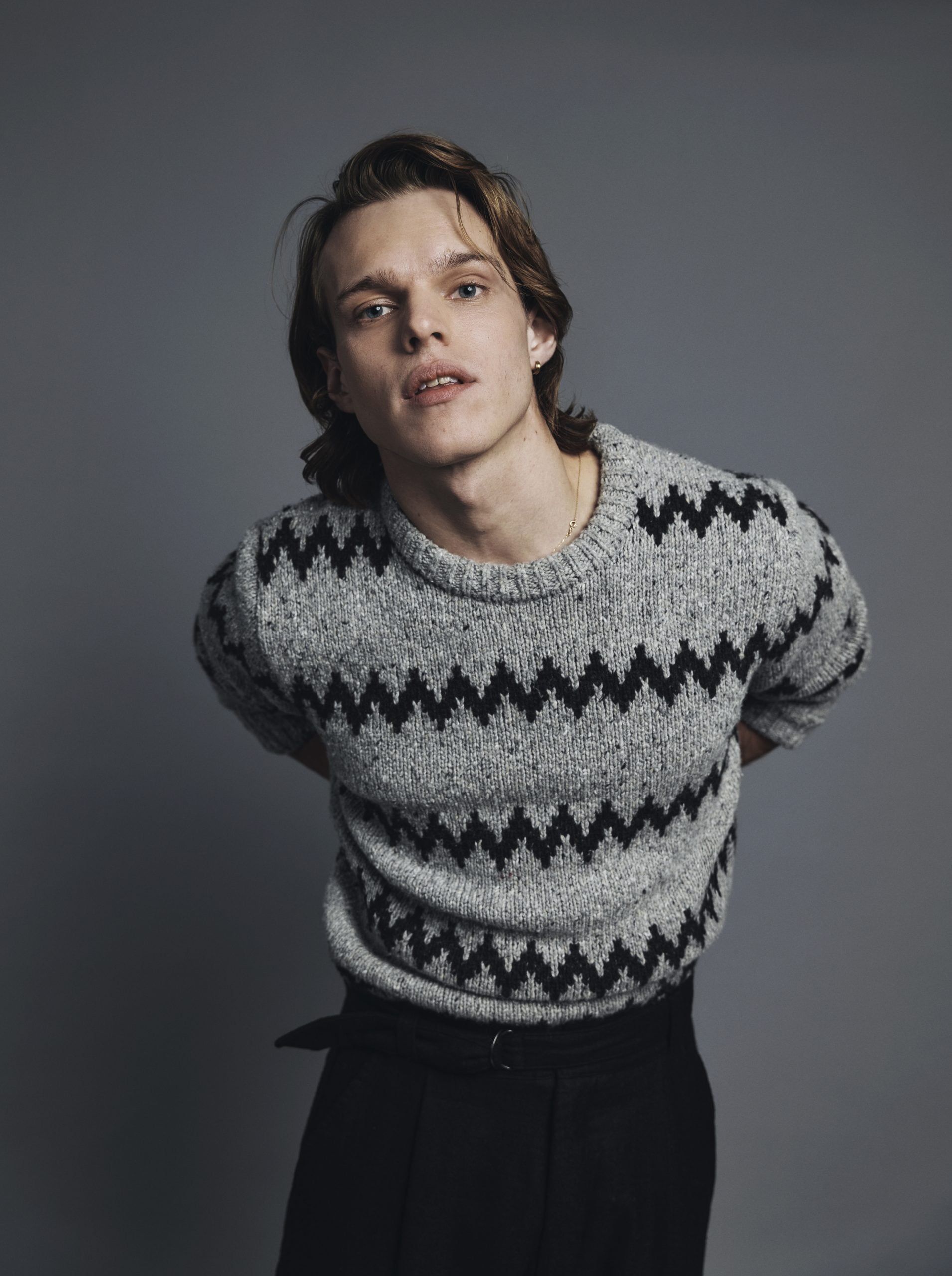
You shot out of order because of the weather and such, but I know these two episodes were shot closer to the end of shooting. What was it like to have that build-up and have this catalyst moment?
It was great because those are the biggest scenes for me and you can see the biggest evolution. It’s great because I had the time to sit with it, but also incredibly stressful knowing that you might be doing a great job with the scenes in episodes one to four but what if I sucked at the end? What if I just wasted all of their money? [Laughs] I wrote in my diary day-by-day what I would be doing and I knew it was creeping closer and closer… And then I got COVID and had to wait another 10 days. I was so ready to go and then I was on my own for what felt like ages with all that stress and pent-up energy. I knew it was going to be fine in the end especially working with Jodie [Foster], John, Issa, and everyone else. I could suck and it would still be a good TV show because we have these people [laughs]. I arrived on set and felt really chill. I knew everyone was going to help me do a good job.
You really were in such amazing hands. I know it’s a very basic question to ask but I feel like I have to: what was it like working with Jodie Foster? She’s a legend.
She’s a complete gem to work with. She’s been so gracious and she always said that she wanted her character to support Navarro’s arc. She’s so patient, kind, and warm. All of the thoughts of, “I’m working with a big movie star” fall away. She also shared some really important things with me when we were doing press together, she just told me to relax because if I get it wrong, I can do it again. I love that. She’s tough but she just wants everyone around her to do good work.
Was there a lot of collaboration on set?
Yeah, absolutely. I wasn’t changing the script up or anything [laughs] but when we did a read-through together, we would look up and say, “We can redo that.” Since I was doing an American accent, some words were difficult for me to say and Issa isn’t precious about her writing so she let things change. The big scene in episode five was a total rewrite.
It’s great that, given the intensity of the scene, you were able to figure it out together in a way that made sense and was natural for you all.
Exactly, and it’s also much more effective. It’s much simpler. There’s no big talk up, it just happens.
I’m not a horror movie girl at all so I was surprised by the amount of paranormal stuff there was in this in addition to the jumps and such.
Yeah, those are massive elements because Issa comes from that world. I’m not a horror movie boy, I find them scary and unnecessary [laughs].
Police officers, of course, only wear the same uniform. Did it feel almost ritualistic to put on that police uniform every time you stepped on set? Did it feel like there was a bit of a mindset change once you had it on?
I was very strict with myself in terms of leaving every part of me at the door. When I came to set, it’s not like I remained in character but I always in an American accent. I struggle with it unless I have a run-up. That, and the costume, helped me get into character in different ways. I remember working with Issa because she noticed my shoulders slouched and she’d say, “You’re a cop! Stand up!” She warned me that if I didn’t stop doing it, she would put tape on my back and it would stretch my skin [laughs]. The uniform, the belt, the weight of things, and other stuff all make you walk differently. I think Pete is proud to be a cop. I’m not sure I would be proud to be a cop, but he is proud to be one. I think he sees it as a symbol… Or a lifeline. There is a ritual of putting on that costume and feeling different.
I read you sent a photo of you in costume to your dad and he was not impressed [laughs].
[Laughs] He always said I could be anything but a tory and a cop and I’ve already disappointed him.
I loved the finale so much — the fact that it was teased that it was the supernatural that caused the murders when, in reality, it was the women taking the power so much — it brought tears to my eyes. So much of the show is about missing Indigenous women and domestic violence. What was it like for you to see them take back the power on-screen?
I watched it for the first time in London with Issa and the rest of the post-production team. Issa was giving notes and little tweaks, and I pretty much started crying as soon as they were around the fire and cried until the end. It’s not just because I was proud and it felt like this huge cathartic moment seeing all of our work come together, but they [characters] achieved justice. This isn’t the most appropriate thing to say, but I thought, “They got them!”
That’s exactly how I felt.
You’re proud of them for doing it. That incredible flashback scene of them blasting through the doors with the guns… That’s a real striking image. I was just in floods of tears and they had to go on to do more stuff, so I sat at the bar in a pub just across the way from the studio. I had a pint and I was just staring at it, almost like I was looking down the barrel of the gun or something. Issa then called and I met them and she asked me what I thought and I burst into tears again. I think she was really, really pleased to see how much it affected me.
It must’ve been nice to have that experience with Issa because she hand-picked you for this role, right?
Yeah, in some ways she did. She directed a block of a show and she had seen my tape and really loved it. We kept in touch over the years and she called me up and asked me to audition for this. She said, “You’re a nobody so HBO probably won’t go for it but at least try.” I sent in a tape and she thought it was great and checked with the big bosses and they liked it, too. I’ve always been really lucky to have credible older people in my life who have always looked out for me. I’m privileged and I want to always recognize that privilege. Issa has changed my life and I’m extremely, extremely grateful.
Knowing his arc, if you could give a piece of advice to Pete, what would it be?
My advice to Pete would be to take care of your family and fucking spend time with your wife and son. I’ve seen all this shit on Reddit and —
Reddit is where good souls go to die sometimes, they question everything.
Exactly. They said all this shit like, “She needs to leave him alone, he’s a cop.” And I’m just thinking how Pete basically forced her to have a baby and then left her when she needed him while she was doing school and being a nurse! The bottom line is that Pete needs to be a better father and a better husband because he has a beautiful and intelligent wife and a lovely kid as well. He needs to hold on to what he’s got. Otherwise, he’s going to be lonely.
Season 4 of True Detective is exclusively available on Sky Atlantic in the UK.
Interview Kelsey Barnes
Photography in loving memory of Joseph Sinclair
Styling Catherine Hayward
Grooming Nadia Altinbas

